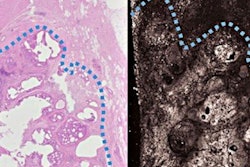Women with ductal carcinoma in situ (DCIS) who choose bilateral mastectomy to reduce the risk of developing cancer in the opposite breast are likely being overtreated, according to a study presented at the American Society of Breast Surgeons (ASBrS) annual meeting in Las Vegas.
Researchers at Memorial Sloan Kettering Cancer Center conducted a study of 2,750 DCIS patients who underwent breast-conserving lumpectomy surgery. They found that only 2.8% developed a second contralateral cancer after five years, and only 5.6% did so after 10 years.
"A rapidly growing number of women are choosing double mastectomies for DCIS, perhaps because they misperceive their risk of future cancer. Our research provides important data for treatment decision-making," lead author Dr. Megan Miller said in a statement released by the ASBrS. "It suggests patients and their doctors should focus on risk factors and appropriate therapy for the diseased breast, not the opposite breast, and that ipsilateral DCIS should not prompt a bilateral mastectomy."



















